Insights, Products
10+ RCS use cases and messaging examples for your business
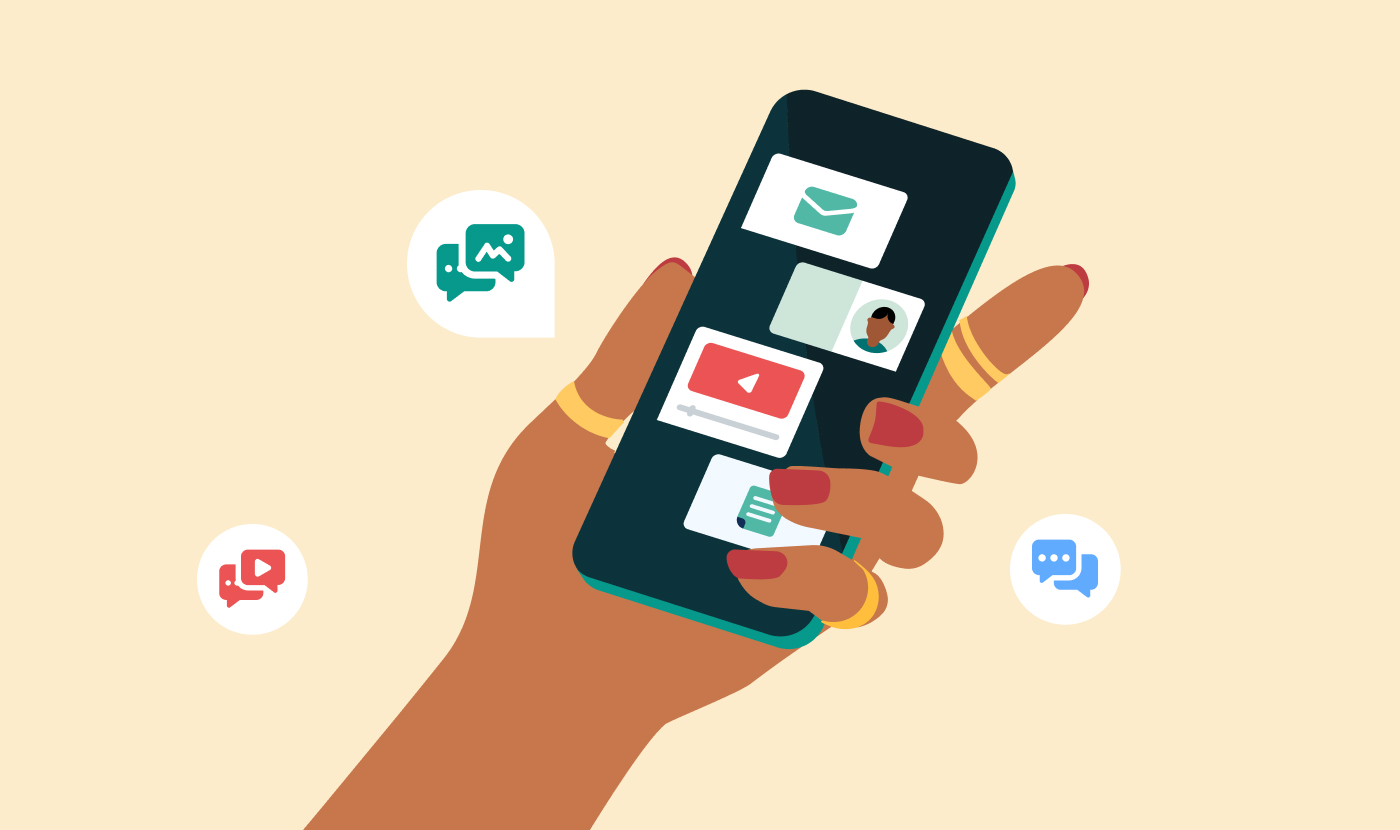
Insights, Products

With a 160-character limit and no ability to include images, SMS can feel like painting a mural with a single brushstroke. Marketers and product managers often find themselves struggling to convey complex ideas or create engaging experiences within these constraints.
Rich Communication Services (RCS) messaging is the next evolution in mobile communication, taking the best aspects of SMS and adding advanced features that enhance customer interactions.
In 2024, Apple began rolling out RCS support for both person-to-person (P2P) and application-to-person (A2P) messaging in select markets and with certain carriers. This development opens up exciting possibilities for rich, interactive business messaging across both Apple and Android devices in the future.
The potential impact of RCS use cases for business is huge. Expect increased engagement, higher conversion rates, and seamless customer experiences — all leading directly to higher sales and stronger customer loyalty.
We’ll explore 11 compelling RCS examples that show how businesses are improving their messaging strategies. But first, let’s examine the core capabilities that make RCS so powerful.
Unlike SMS, which is limited by text-only content and basic delivery receipts, RCS offers a richer, more secure, and interactive messaging experience. RCS blends visual appeal with functionality, transforming simple text interactions into dynamic, app-like experiences within a user’s native messaging interface.
This technology stands out in the following ways:
These capabilities open up a world of possibilities for RCS use cases, which we’ll explore in the examples below.
RCS opens exciting possibilities for marketers with over a billion monthly active users. It combines the wide reach of SMS with interactive features that can really boost engagement.
It’s like upgrading from a basic flip phone to a smartphone — suddenly you’ve got so many more ways to connect with people.
RCS’s rich cards and interactive buttons empower customers to take immediate action, whether making a purchase or scheduling an appointment. These features make it easier for people to respond and interact with brands, potentially leading to better results for marketing campaigns.
In the example below, Printemps uses RCS for their Father’s Day campaign:
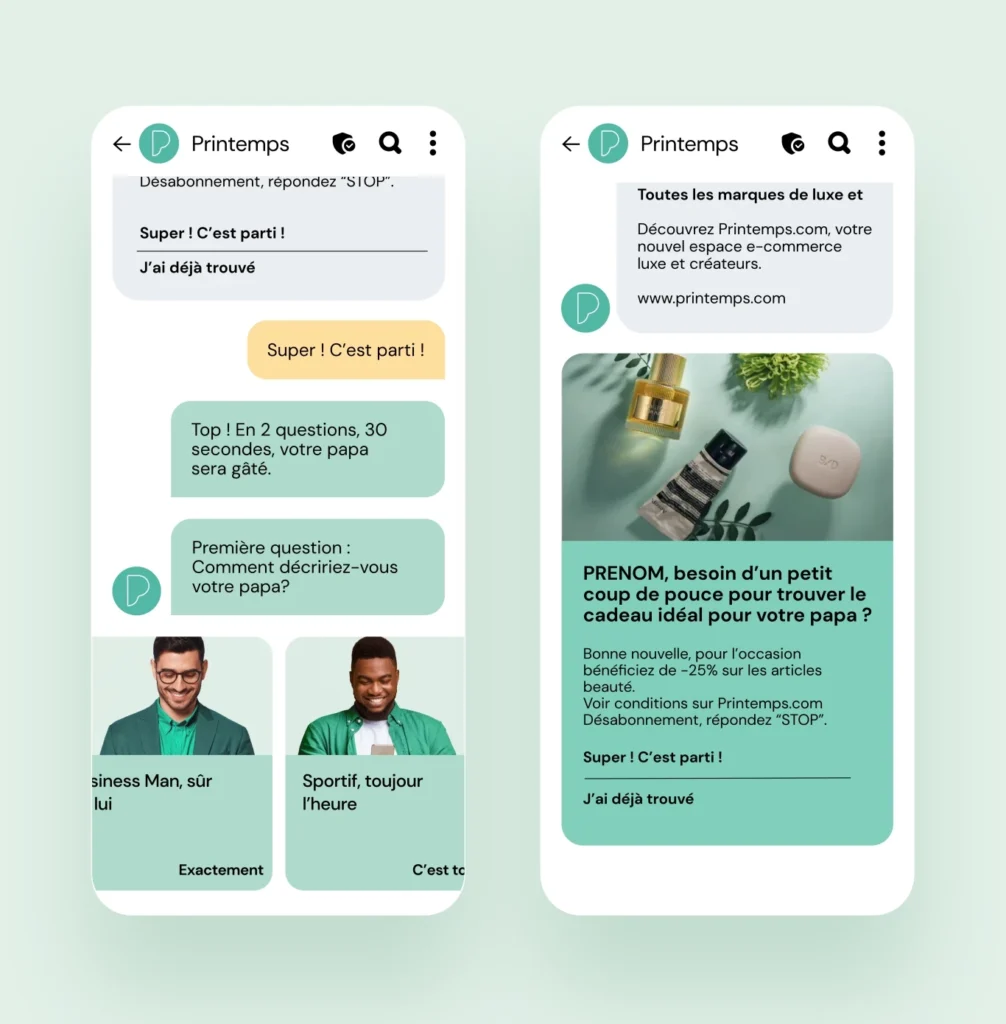
Beyond enhancing engagement, RCS contributes to consumer trust by allowing you to add your logo and brand colors to messages, reassuring customers they’re hearing from you, not an impersonator.
RCS statistics indicate that 71% of customers say they’ll stop buying from a company if their trust is broken, so this is huge.
RCS business messaging is a powerful tool for Black Friday and Cyber Monday (BFCM) campaigns, offering an interactive experience right in customers’ native mobile messaging inboxes.
How does it work? RCS lets you send eye-catching promotions that blend text, high-quality images, and interactive elements like buttons and carousels, which help you stand out during the BFCM rush. In fact, 90% of rich media messages are opened within 15 minutes and customers engage with RCS content for up to 45 seconds.
This allows shoppers to browse deals, make purchases, or get more info without leaving the messaging interface.
Citadium, a French urban fashion retailer, used RCS to send out branded messages featuring a prominent 40% off site-wide deal, with interactive buttons that allowed shoppers to jump directly to specific product categories.
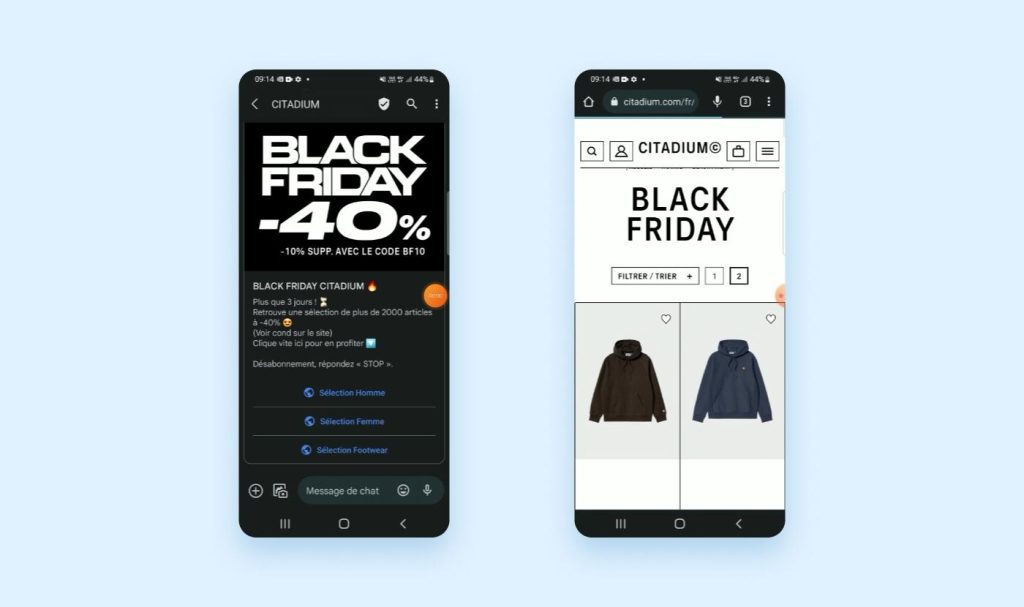
This streamlined approach made it easy for customers to quickly find and buy what they wanted.
Imagine being able to send your customers a mini-catalog right in their text messages — complete with beautiful images they can swipe through and buttons they can tap to learn more or buy.
French frozen food company, Picard, used RCS to create a personalized holiday menu experience using customer data. Customers could chat about their preferences and budget, and instantly receive a custom menu suggestion with product images and buy buttons.
Watch how Picard turns a simple text conversation into a personalized shopping experience, boosting engagement and sales with RCS messaging.
The results were remarkable: click-through rates tripled, and customer engagement shot up by 42%.
Forget plain text and links – now you can send PDFs and videos right within a message. Walk customers through their bills, explain charges, and even offer payment options — all without them having to leave their app.
Given that 38% of consumers in 2024 prefer working with customer service via messaging channels, providing detailed invoices with interactive elements can meet this expectation and boost customer satisfaction.
Bouygues Telecom in France took this idea and ran with it. They used RCS to send videos explaining their service along with the invoice. Customers could then use quick reply buttons to activate the service or chat with a bot if they had questions.
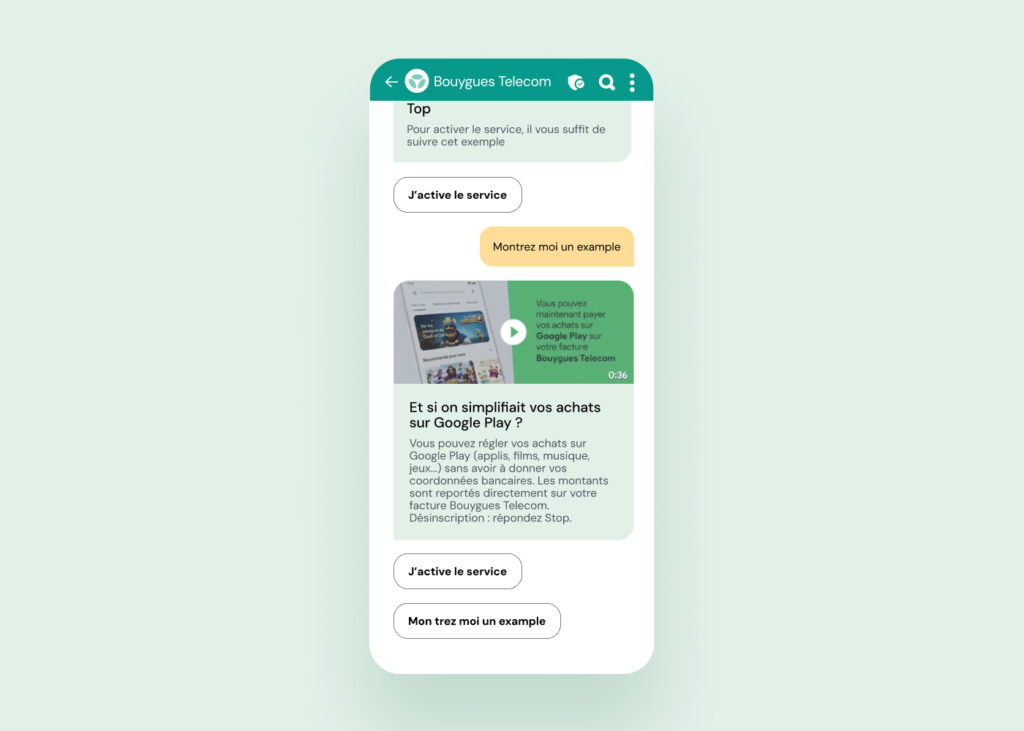
The results? Pretty impressive. They saw a 69% read rate and a whopping 80% increase in conversions compared to regular SMS. When you make things clear and easy for customers, they’re more likely to stick around and even upgrade their services.
Your customer is strolling down the street, and their phone buzzes with an RCS message. They open it to find a personalized offer from your store, complete with an interactive map showing them exactly how to get there.
RCS lets you send rich, engaging content — like images, GIFs, videos, and even real-time maps. This powerful combination of personalization and visual appeal can boost foot traffic to your physical locations, turning casual browsers into curious visitors and potentially loyal customers.
For retail businesses, restaurants, and service providers, this feature of RCS presents an opportunity to increase local sales and create a more engaging, personalized experience for customers.
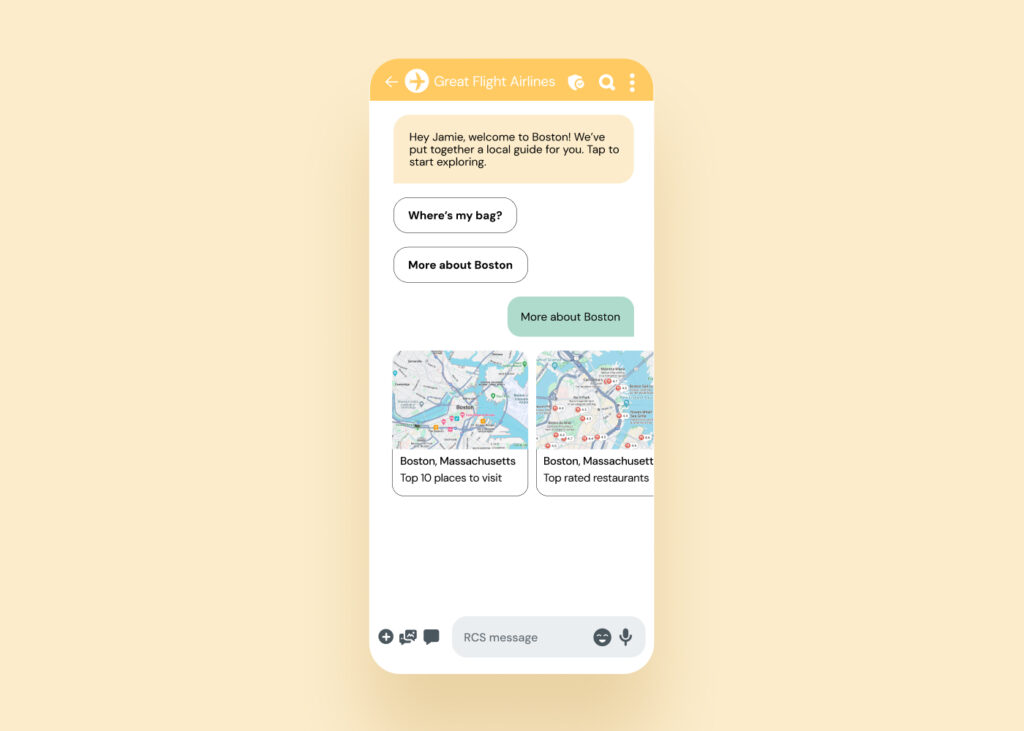
Forget boring plain-text newsletters clogging up email inboxes. RCS lets you deliver instant, attractive newsletters right to customers’ phones.
Think of it as an upgraded version of your email strategy. Deliver rich, interactive content that engages and captivates customers.
We’re talking vibrant images, videos, and even polls or quizzes — all without customers needing to open a separate app. It’s a great way to keep your brand top-of-mind and drive engagement.
Take Micromania-Zing, for example. This GameStop subsidiary wanted to give their holiday marketing ideas a boost, so they mixed RCS into their omnichannel strategy. Just days before Christmas, they targeted last-minute shoppers with visually appealing RCS newsletters.

They experienced an 86% jump in read rates compared to email, and a whopping 120% increase in web clicks versus Rich SMS.
RCS takes order confirmations from mundane to memorable. Imagine sending your customers an interactive message right after they’ve made a purchase.
The text includes high-quality images of the products they’ve just bought, personalized with their name and order details. You can even throw in a map showing their delivery route or a countdown to their expected arrival time.
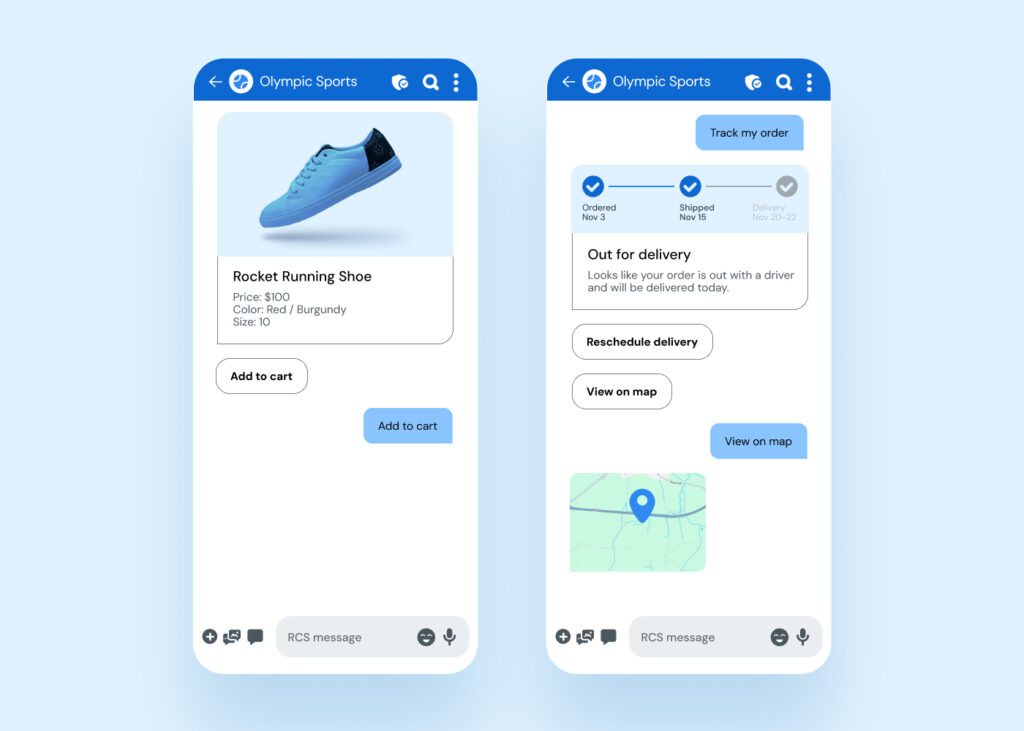
These messages also have incredibly high open rates. People are eager to see the details of their purchase, and RCS delivers this information in a visually appealing, easily digestible format.
RCS appointment reminders include all the essential details — date, time, location, even a map — presented in a visually-appealing way. Plus, you can add personalized touches like the name of the staff member they’ll meet with.
Need to reschedule? Just tap a button. Want to confirm? One click does it. This approach reduces no-shows and enhances the customer experience. It makes them feel valued and well-informed from the moment they book.
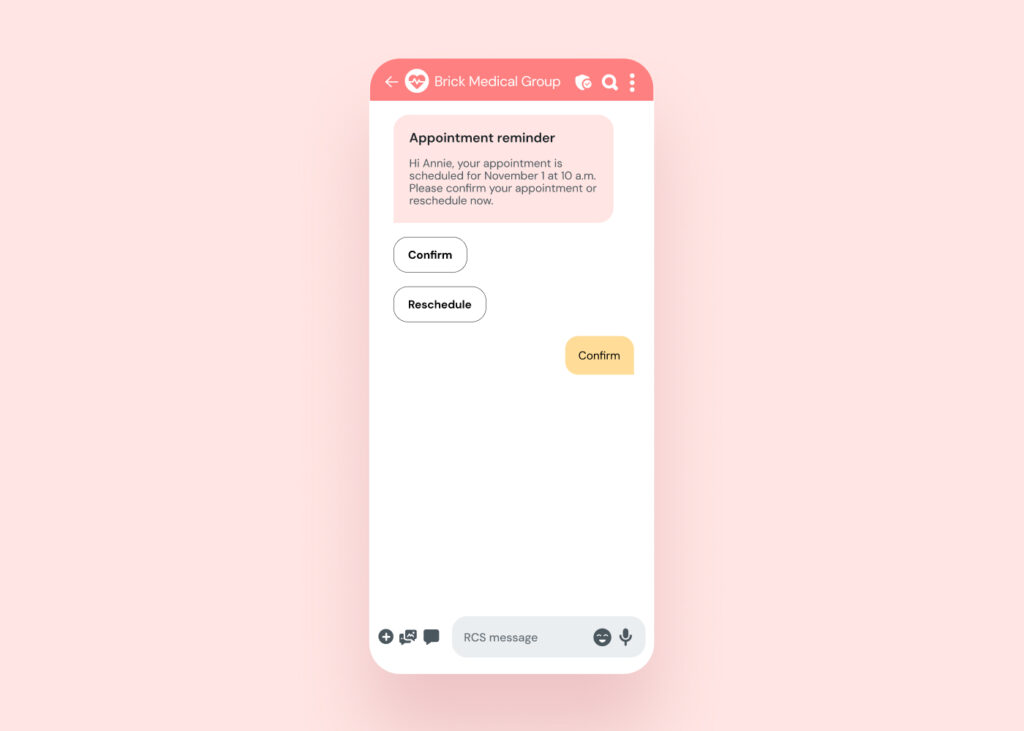
RCS shines when it comes to sending critical, time-sensitive notifications. With verified sender profiles, customers can instantly recognize that the message is authentic and important. This trust factor is crucial when you need to convey urgent information quickly and reliably.
EasyPark demonstrates this perfectly in their approach to critical notifications.
For Android users with RCS-compatible devices, they send branded messages with a verified sender badge that stands out in the inbox, instantly establishing trust.
For customers without RCS-enabled devices, EasyPark sends SMS. This dual approach ensures that every customer receives critical updates about their parking, regardless of their device or network capabilities.
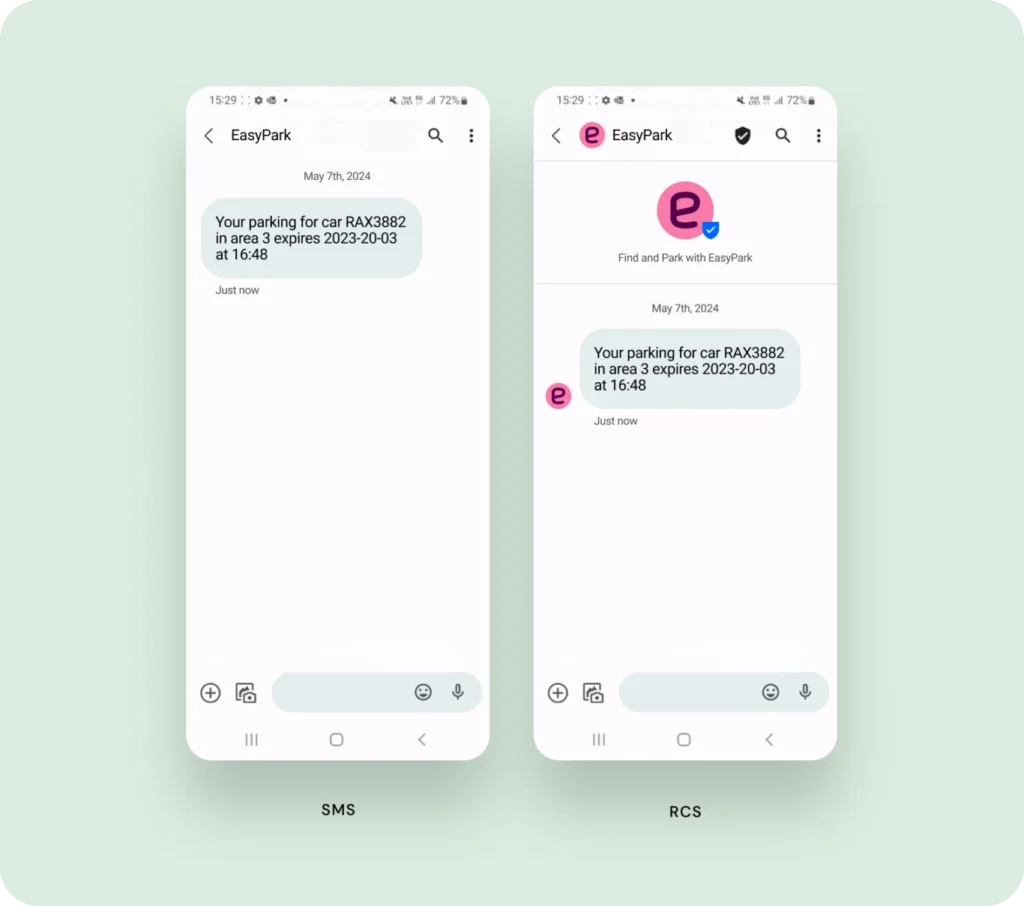
The approach is particularly effective in situations where timely communication is crucial.
It’s a smart strategy that combines RCS with the universal reach of SMS, ensuring that no customer misses an important notification.
RCS OTPs come from a branded business profile, instantly establishing trust. This visual verification significantly reduces the risk of phishing attacks, as customers can easily distinguish legitimate messages from fraudulent ones.
The branded nature of RCS also improves the overall user experience. Customers feel more confident entering a code when they know it comes from a verified source.
Plus, with RCS’s rich features, businesses can include additional helpful information or instructions within the OTP message, making the authentication process smoother and more user-friendly.

RCS’s rich features and high engagement rates help you drive opt-ins for other communication channels and create a more cohesive customer experience across all touchpoints in the customer journey.
Take BUT, the French home furnishing retailer, as a prime example. They created an omnichannel marketing strategy by starting with WhatsApp catalogs and saw 75% read rates and 57% click-through rates. However, they didn’t stop there.
By adding RCS to their mix, they achieved a stellar 20% click-through rate. This success led them to fully embrace the platform, launching 20 marketing campaigns reaching over five million contacts.
The real impact happened when BUT used RCS alongside traditional SMS, email, Instagram, and web channels to grow their WhatsApp opt-in base.
BUT achieved a staggering 123% increase in their WhatsApp customer base. This is a great demonstration of the ability for RCS to work in harmony with other messaging channels, creating a robust, interconnected marketing ecosystem that drives results across the board.
When comparing RCS vs. WhatsApp for these kinds of campaigns, RCS offers a more integrated experience directly within the default messaging app.
From interactive product catalogs and personalized newsletters to secure OTPs and critical notifications, RCS offers a rich, engaging platform for communication. Its verified sender profiles build trust, while its interactive features drive higher engagement and conversion rates.
With RCS and RBM being rolled out in iOS 18, we’re excitedly anticipating news on when RCS business messaging will become available on Apple devices. When that day comes, RCS is set to become a new standard for business messaging, transforming how brands connect with their customers.
Want to learn more? Download our guide now to learn how to unlock the full potential of RCS and stay ahead in customer engagement.